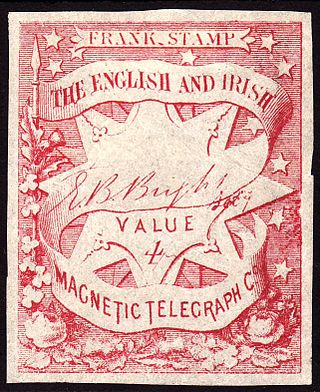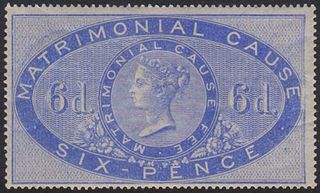
HM Customs and Excise was a department of the British Government formed in 1909 by the merger of HM Customs and HM Excise; its primary responsibility was the collection of customs duties, excise duties, and other indirect taxes.

The Inland Revenue was, until April 2005, a department of the British Government responsible for the collection of direct taxation, including income tax, national insurance contributions, capital gains tax, inheritance tax, corporation tax, petroleum revenue tax and stamp duty. More recently, the Inland Revenue also administered the Tax Credits schemes, whereby monies, such as Working Tax Credit (WTC) and Child Tax Credit (CTC), are paid by the Government into a recipient's bank account or as part of their wages. The Inland Revenue was also responsible for the payment of child benefit.

A revenue stamp, tax stamp, duty stamp or fiscal stamp is a (usually) adhesive label used to designate collected taxes or fees on documents, tobacco, alcoholic drinks, drugs and medicines, playing cards, hunting licenses, firearm registration, and many other things. Typically, businesses purchase the stamps from the government, and attach them to taxed items as part of putting the items on sale, or in the case of documents, as part of filling out the form.

The Gibraltar Study Circle is a global non-profit society based in the United Kingdom, founded by Walter (Wally) Jackson in 1975. Its aim is to expand the knowledge of the philately of Gibraltar, a British overseas territory located at the entrance to the Mediterranean Sea overlooking the Strait of Gibraltar. The study circle looks at the philately of Gibraltar in all its forms for the benefit of collectors (philatelists) from all walks of life. This includes studying the postal history, postage stamps, revenue stamps, postal stationery and associated overprints from Gibraltar and any of these used in Morocco. Any new information is shared with the membership via its quarterly journal, "The Rock", which has been published since 1975, showing articles of interest not only to philatelists but also historians, artists and sociologists.

The British Library Philatelic Collections is the national philatelic collection of the United Kingdom with over 8 million items from around the world. It was established in 1891 as part of the British Museum Library, later to become the British Library, with the collection of Thomas Tapling. In addition to bequests and continuing donations, the library received consistent deposits by the Crown Agency and has become a primary research collection for British Empire and international history. The collections contain a wide range of artefacts in addition to postage stamps, from newspaper stamps to a press used to print the first British postage stamps.

The Crown Agents Philatelic and Security Printing Archive was deposited with the British Museum from the 1960s, though the first recorded deposit from the Crown Agents was in 1900. The archive consists of a range of philatelic and written material which were the Crown Agents' working records. It is the most comprehensive record of British Colonial and Commonwealth stamp issues of the last 100 years.
The Foreign and Commonwealth Office Collection was formed by instruction from the Secretary of State for the Colonies on 23 April 1890 to all territories under his authority. The intention was to have a record of all Colonial Postage and revenue stamps, postcards, embossed envelopes and newspaper wrappers. The collection contains single examples of the stamps in use at that time as well as some obsolete issues and single copies, usually from first printings, from 1890. Variations such as colour varieties and alternate watermarked papers are included.
The Board of Inland Revenue Stamping Department Archive in the British Library contains artefacts from 1710 onwards, and has come into existence through amendments in United Kingdom legislation.

A savings stamp is a stamp issued by a government or other body to enable small amounts of money to be saved over time to accumulate a larger capital sum. The funds accumulated may then be used to make a larger purchase such as taking out a savings bond or to pay a large upcoming bill. Often issued in conjunction with post office run savings banks, savings stamps have also been issued by private companies. Supermarkets have issued the stamps to enable the spreading of large bills, package holiday companies have used them to enable customers to save for an annual holiday, and utilities companies have used the stamps to enable customers to spread the cost of their bills.
The Davies Collection is a collection of Libyan revenue stamps from 1955 to 1969, formed from material from the Bradbury Wilkinson Archive, and presented to the British Library Philatelic Collections by John Neville Davies in 1992.
The Burnett Collection is a collection of Hyderabad stamps, postal stationery, and postal history material formed by A.H. Burnett and given to the British Library by his sons A.D. and R.G. Burnett in 1991. It forms part of the British Library Philatelic Collections.

The Contributions Agency Collection is a collection of British National Insurance stamps that forms part of the British Library Philatelic Collections.

The Sherborn Collection is a collection of 1841-85 Queen Victoria embossed 1d pink postal stationery stamped envelopes that forms part of the British Library Philatelic Collections. The collection was formed by C. Davis Sherborn and donated to the British Museum in 1913.

The Langmead Collection is a collection of British and Irish telegraph stamps and stationery from 1851 to 1881 that forms part of the British Library Philatelic Collections. It was formed by Peter Langmead and received by the Library under the "in lieu of tax" scheme in 1991.
The H.M. Customs and Excise Collection is a collection of British revenue stamps in proof or registration form for Table Water Duty, Medicine Tax, Playing Card Tax and other duties. It forms part of the British Library Philatelic Collections and was transferred to the Library by H.M. Customs & Excise in 2002.
The Turner Collection of Newspaper Tax Stamps is a collection of newspaper tax stamps of the United Kingdom and of the 1694 6d revenue tax stamps that forms part of the British Library Philatelic Collections. It was formed by S.R. Turner and donated in 1973.
The Ryan Collection is a collection of municipal revenue stamps of Budapest from 1898 to 1947 formed by Gary Ryan. It forms part of the British Library Philatelic Collections and was donated to the Library in 2001.

Revenue stamps of the United Kingdom refer to the various revenue or fiscal stamps, whether adhesive, directly embossed or otherwise, which were issued by and used in the Kingdom of England, the Kingdom of Great Britain, the United Kingdom of Great Britain and Ireland and the United Kingdom of Great Britain and Northern Ireland, from the late 17th century to the present day.
Radford Henry (Harry) Dagnall MA, AKC, FRPSL, was a British philatelist and Fellow of The Royal Philatelic Society London who made a lifetime's study of some of the by-ways of philately with a special interest in revenue philately.

John Wood (1790–1856) was a British civil servant who was chairman of the United Board of Stamps and Taxes from 1833 to 1838 and subsequently the first chairman of the Board of Inland Revenue in 1849. In 2012, H.M. Revenue and Customs, successors to Inland Revenue, transferred a collection of revenue dies to the philatelic collections of the British Library that included Wood's personal embossing die. Official correspondence relating to Wood is held in the British National Archives.












